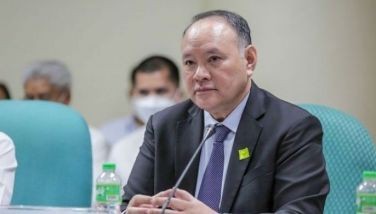Citing ’04 political uncertainty, Moody’s downgrades RP rating
October 1, 2003 | 12:00am
Moody’s Investors Service has downgraded the outlook on several Philippine key foreign currency ratings to negative from stable, citing political risks ahead of presidential polls in May next year.
The cut weakened the peso and widened spreads on Philippine sovereign bonds but the ratings agency maintained its "Ba1" rating on foreign debt, leaving it one notch below investment grade and one higher than those assigned by rival agencies.
But Malacañang downplayed the credit downgrade, insisting that the country is now on its way to economic recovery.
Deputy presidential spokesman Ricardo Saludo said the government is not concerned about the latest downgrade because the country’s economic fundamentals remain favorable.
"There may be negative ratings that may come out from time to time but we look the overall positive ratings that we are getting from broad range of rating agencies," Saludo said.
Finance Secretary Jose Isidro Camacho said there will be no change in the government’s foreign borrowing plans for the rest of the year despite the ratings outlook cut by Moody’s.
Camacho said Moody’s comments on heightened political risk in the country were not new to investors and had already been factored in to Philippine bond prices.
"I don’t think so because what’s more important in the outlook is the underlying reason," he said when asked if the government would revise its borrowing plans.
"The information embodied (in the Moody’s statement) has been digested by the market long before. It’s not a new discovery," Camacho added.
Moody’s said in a statement that the outlook change was made to the "Ba1" foreign currency rating for government bonds, the "Ba1" long-term foreign currency country ceiling for bonds and the "Ba2" long-term foreign currency ceiling for bank deposits.
It affirmed the negative outlook on the government’s "Baa3" local currency rating.
Moody’s said that recent political developments, including a brief coup attempt in July and legal moves against senior officials in the Bangko Sentral ng Pilipinas (BSP) "reflect deep political tensions."
Although President Arroyo has prevailed against these challenges, it said "political risks are rising as the 2004 presidential election approaches."
The rating agency said a continued deterioration in the political climate could weaken further the Philippines’ external payments position.
The export performance has faltered so far this year, reducing the current account surplus and augmenting pressures on the capital account.
Mrs. Arroyo, who returned from a five-day trip to the US and Europe yesterday, quashed a military mutiny involving 300 soldiers who seized a luxury apartment hotel in Makati City on July 27.
The revolt, which the government said was part of a coup attempt against Arroyo, has shaken investor confidence and has raised fears of more destabilization plots.
The armed forces had gone on alert to deter any plots that might be launched during Mrs. Arroyo’s absence.
Investor confidence also took a knock recently when a local court suspended BSP Governor Rafael Buenaventura and several other key central bank officials for a year without pay, ruling that they had abused their authority in closing down Urban Bank in April 2000.
Buenaventura, who has asked the court to cancel the one-year suspension, remains in his post pending his appeal and has defended his decision to close the bank.
The government plans to raise $250 million for its remaining financing requirements this year after tapping the global market earlier this year for a total of $2.25 billion, including $750 million for cash strapped state firm National Power Corp. (Napocor).
But the government also plans to start its 2004 overseas borrowings – estimated to total $1.8 billion – later this year.
"We do not intend to change our borrowing plans even with the outlook change," National Treasurer Sergio Edeza said. — AFP, Ted Torres
The cut weakened the peso and widened spreads on Philippine sovereign bonds but the ratings agency maintained its "Ba1" rating on foreign debt, leaving it one notch below investment grade and one higher than those assigned by rival agencies.
But Malacañang downplayed the credit downgrade, insisting that the country is now on its way to economic recovery.
Deputy presidential spokesman Ricardo Saludo said the government is not concerned about the latest downgrade because the country’s economic fundamentals remain favorable.
"There may be negative ratings that may come out from time to time but we look the overall positive ratings that we are getting from broad range of rating agencies," Saludo said.
Finance Secretary Jose Isidro Camacho said there will be no change in the government’s foreign borrowing plans for the rest of the year despite the ratings outlook cut by Moody’s.
Camacho said Moody’s comments on heightened political risk in the country were not new to investors and had already been factored in to Philippine bond prices.
"I don’t think so because what’s more important in the outlook is the underlying reason," he said when asked if the government would revise its borrowing plans.
"The information embodied (in the Moody’s statement) has been digested by the market long before. It’s not a new discovery," Camacho added.
Moody’s said in a statement that the outlook change was made to the "Ba1" foreign currency rating for government bonds, the "Ba1" long-term foreign currency country ceiling for bonds and the "Ba2" long-term foreign currency ceiling for bank deposits.
It affirmed the negative outlook on the government’s "Baa3" local currency rating.
Moody’s said that recent political developments, including a brief coup attempt in July and legal moves against senior officials in the Bangko Sentral ng Pilipinas (BSP) "reflect deep political tensions."
Although President Arroyo has prevailed against these challenges, it said "political risks are rising as the 2004 presidential election approaches."
The rating agency said a continued deterioration in the political climate could weaken further the Philippines’ external payments position.
The export performance has faltered so far this year, reducing the current account surplus and augmenting pressures on the capital account.
Mrs. Arroyo, who returned from a five-day trip to the US and Europe yesterday, quashed a military mutiny involving 300 soldiers who seized a luxury apartment hotel in Makati City on July 27.
The revolt, which the government said was part of a coup attempt against Arroyo, has shaken investor confidence and has raised fears of more destabilization plots.
The armed forces had gone on alert to deter any plots that might be launched during Mrs. Arroyo’s absence.
Investor confidence also took a knock recently when a local court suspended BSP Governor Rafael Buenaventura and several other key central bank officials for a year without pay, ruling that they had abused their authority in closing down Urban Bank in April 2000.
Buenaventura, who has asked the court to cancel the one-year suspension, remains in his post pending his appeal and has defended his decision to close the bank.
The government plans to raise $250 million for its remaining financing requirements this year after tapping the global market earlier this year for a total of $2.25 billion, including $750 million for cash strapped state firm National Power Corp. (Napocor).
But the government also plans to start its 2004 overseas borrowings – estimated to total $1.8 billion – later this year.
"We do not intend to change our borrowing plans even with the outlook change," National Treasurer Sergio Edeza said. — AFP, Ted Torres
BrandSpace Articles
<
>
- Latest
- Trending
Trending
Latest
Trending
Latest
Recommended


























